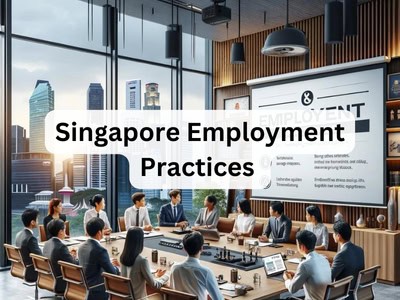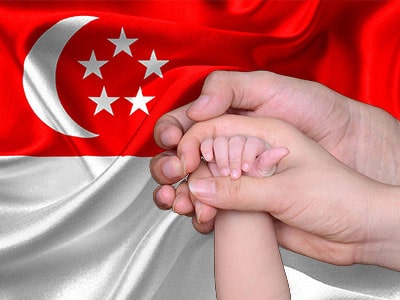This post is also available in:
简体中文 (Chinese (Simplified))
Know All About Singapore Employment Practices
The article gives you a general introduction to the statutory requirements as stipulated in the Singapore Employment Act and common employment practices that cover employment contracts, salaries, public holidays, benefits when hiring staff in Singapore and so on.
A. Employment Act

B. Leave Entitlement
1. Annual leave
As stipulated in the Act, an employee must serve his employer for a minimum service period 3 months to be entitled to paid annual leave. An employee is eligible to have at least 7 days of paid annual leave in the first year of his service. Having said that, Singapore’s standard practice is employee will be entitled to at least 14 days of paid annual leave per year.
2. Sick leave
According to the Act, an employee is entitled to paid sick leave if he has fulfilled the following requirements:
- He has been serving the same employer for at least 3 months;
- He managed to inform his employer of his medical leave within 48 hours;
- His sick leave is proven and attested by a doctor, general practitioner, or dentist via the medical certificate (which is also known as “MC” in Singapore).
An employee who has served the employer for three months are entitled to a minimum of 5 days of sick leave and 15 days of hospitalization leave. The ceiling of the number of sick and hospitalization leave days (that an employee is entitled to) are 14 and 60 days, respectively. Please note that the total number of sick and hospitalization leave days (an employee is entitled to) are based on the length of his service.
3. Maternity leave
According to the Child Development Co-Savings Act, a female employee will be entitled to a 16-week of paid maternity leave if she has fulfilled the following requirements:
- she is in lawful marriage with the father of the child;
- the child is a Singapore Citizen;
- for salaried female employee: she has been working for the same employer for at least 3 months before the child’s birth
- For self-employed mother: she has been continuously self-employed for a minimum of 90 days before the child’s birth and there is no discontinuation of her source of income during her maternity leave period.
The female employee is entitled to a 12-week paid maternity leave if:
- she is a single mother, or
- the child is not Singapore Citizen, or
- the parents are foreigners who are working in Singapore (be it on a full-time employment contract or a contractual basis)
4. Paternity and shared parental leave
Working fathers in Singapore, be it salaried or self-employed, are entitled to 1-week government-paid paternity leave as well as a share of 1 week of his spouse’s 16-week paid maternity leave if he fulfils the following requirements:
- he is in lawful marriage with the child’s mother;
- the child is a Singapore citizen;
- for salaried father: he has been working for the same employer for at least 3 months before the child’s birth, or
- For self-employed father: he has been continuously self-employed for at least 90 days before the child’s birth and there is no discontinuation of his source of income during the period of paternity leave.
5. Childcare and infant care leave
The Child Development Co-Savings Act stipulates that an employee is entitled to 6 days of unpaid infant care leave and 6 days of paid childcare leave per annum (regardless of the number of children) if he or she fulfils all of the following conditions/requirements:
- Childcare leave: The child must be below 7 years old;
- For infant care leave: The child must be below 2 years old;
- The child is a Singapore Citizen; and
- The child’s parents are/were in lawful marriage.
- For salaried parents, he or she has been working for the same employer for at least 3 months;
- For self-employed parents, he or she must be engaged in business for a minimum of 3-month period and there must be no discontinuation of his or her source of income during the childcare or infant care period.
Please note that the employer will bear the first three days of childcare leave while the Government will bear the last three days (amount capped at $500 per day, including CPF).
6. Unpaid infant care leave
On top of the 6-day paid childcare leave, parents are entitled to another 6-day childcare leave without pay with the conditions:
- The child is a Singapore citizen (including legally adopted children or stepchildren).
- The child is aged 2 and below,
C. Public Holidays

1. Gazetted public holidays
- 1 January 2019– New Year’s Day
- 5 & 6 February 2019– Chinese New Year
- 19 April 2019– Good Friday
- 1 May 2019– Labour Day
- 19 May 2019 – Vesak Day
- 5 June 2019 – Hari Raya Puasa
- 9 August 2019 – National Day
- 11 August 2019 – Hari Raya Haji
- 27 October 2019 – Deepavali
- 25 December 2019 – Christmas Day
2. Holiday pay
Employee is entitled to his gross rate of pay, if:
- He was not absent on the working day immediately before or after a holiday without permission or a justifiable reason.
- He is on authorised leave (for example sick leave, annual leave, and unpaid leave) on the day immediately before or after a holiday.
However, he is not entitled to holiday pay if the holiday falls on his approved unpaid leave.
3. Public holidays that fall on a rest day or non-working day
According to the Act, employees are entitled to another day off or one extra day’s salary in lieu of the public holiday at the gross rate of pay if a public holiday falls on a non-working day.
- For a 5-day workweek, Saturday would be considered as a non-working day. If a public holiday falls on a Saturday, the employee will get either a day off or salary in lieu.
- If a public holiday falls on the employee’s rest day, the following working day will be a paid public holiday for him.
For those who are not covered by the Act, it will be according to the terms of his or her employment contract.
4. Pay for working on a holiday
Employees who are required to work on a public holiday will have an extra day’s salary at the basic rate of pay. However, they will not be entitled to holiday pay if they are absent without reasonable excuse on the working day before or after the holiday. Instead, their employer can deduct the one-day’s pay at the gross rate from their monthly gross salary.
D. Contract of Service

- The employer’s agreement to employ another as a staff, and
- The agreement of the other person to serve as an employee to the employer.
The basic terms and conditions of an Employment Contract include the following:
- Designation
- Job scope
- The staff’s commencement date and employment period
- Hours of work
- Probation clause
- Salary
- Employee benefits
- Leave entitlement
- Code of conduct
- Termination and retrenchment, if applicable
The terms and conditions will be considered as illegal and null if any terms and conditions (in a contract of service) are less favorable than the relevant provision under the Act.
Please also note that the Employment Contract is not a Contract for Services. A Contract for Services in Singapore is an agreement between an independent contractor (e.g. freelancer) and a client (which is usually a company) where there is no employer-employee relationship established in this case.
E. Employment records
In Singapore, it is mandatory for all employers to maintain the detailed employment records of employees as stipulated in the Act.
1. Requirements
- Format: soft copy or hard copy (handwritten documents are included)
- Duration:
Current staff: Latest two years.
Ex-staff: Last two years: employment record is to be kept for one year after the employee leaves the job.
2. The content of employment records
The employment record covers the employee records and salary records (same as for itemised pay slips). The employee records include the following:
- Address
- NRIC number (For non-citizens, to record the work pass number and expiry date)
- Date of birth and gender
- Date of starting employment and date of leaving employment.
- Working hours (inclusive of meal breaks and tea breaks)
- Leave records (dates and other details of public holidays and leave taken)
F. Employing young persons and children
In Singapore, the legal age to work is 17 years and above. Having said that, employers are allowed to hire children and young persons aged 13 years – 16 years. Please note that there are restrictions on the type of work, work setting/location and working hours for children and young persons.
The works that are deemed not suitable for those aged below 16:
- Works with work conditions that may cause injury
- Works involving servicing or attending moving machinery
- The live electrical apparatus that is not effectively insulated is in close proximity
- Any underground work
G. Hours of work, overtime and rest day
As stipulated in Part IV of the Act, the requirements of Hours of Work & Overtime apply to:
- A workman (doing manual labour) with a basic monthly salary less than $4,500.
- An employee who is not a workman, but who is covered by the Act with a monthly basic salary of less than $2,500.
Requirements:
- For those who are covered (under the Act) are entitled to work not more than 8 hours daily, or 44 hours weekly.
- Staff cannot work for more than 6 hours without a break.
- Staff cannot work more than 12 hours per day with the exception of certain circumstances, for example, the occurrence of an actual or threatened accident, work that is essential to national defence or security, or unforeseeable circumstances that lead to disruption of work.
- Shift workers are not permitted to work more than 12 hours daily under any circumstances.
- Staff are entitled to one rest day (which is deemed as a non-working day from midnight to midnight) per week, and is not a paid day.
- The longest possible interval between 2 rest days is 12 days.
H. Part-time employment
1. Definition of part-timer
In Singapore, part-time employees are those who are required to work for not more than 35 hours per week while contract staff are those on fixed-term employment contract as well as those who are hired on an ad-hoc basis (on casual/on-call employment). Therefore, the contract will last only for a specified duration for the specific task as agreed by both parties.
2. Overtime pay
Under the Act, part-timers are entitled to overtime pay if they work in excess of their normal daily working hours.
- Situation A: if a part-timer works more than his or her daily working hours but less than that of a full-time worker, the overtime pay will be his or her basic hourly rate of pay.
- Situation B: if a part-timer works more than the normal daily working hours of a full-time worker, the overtime pay will be 1.5 times of his or her basic hourly rate of pay.
3. Rest days and public holidays
Part-timers are entitled to rest days (and pay for working during those rest days) as well as paid public holidays. While the public holidays are pro-rated based on the number of hours they work, part-timers are entitled to one rest day per week if they are required to work for at least 5 days a week.
i. Re-employment
According to the Retirement and Re-employment Act (RRA), the minimum retirement age in Singapore is 62 years. Therefore, employers are forbidden to dismiss any employee based on an employee’s age. The Singaporean government has mandated employers to offer re-employment to eligible employees who turn 62, up to the age of 67.
Check out the re-employment’s eligibility, guidelines on re-employment, and what to do if there is a dispute from here.
J. Retirement
As stipulated in the Retirement and Re-employment Act (RRA), the minimum retirement age is 62 years old. Employer cannot ask a staff to opt for early retirement and have to offer re-employment opportunity to retiring staff (staff that turn 62) if they meet the eligibility criteria of re-employment.
K. Termination and Retrenchment
1. Termination
An Employment Contract can be terminated by the employer and employee where either party must give each other a written notice of the termination, in accordance to the notice period in the contract. In the case there is no clause of the notice period, the Act as well as the length of service will determine the length of notice.
Any party (be it the employer or the employee) may terminate the employment contract if either party has breached the terms of the contract or due to misconduct. In the case either party wants to terminate the employment before the notice period, either must pay the salary in lieu of notice to the other party. This is an offence punishable by a fine of up to S$5,000 and/or imprisonment of up to 6 months, or both.
2. Retrenchment
In the case of retrenchment, employer needs to take note the following:
- The employer must pay all salaries and benefits that are due to the employees on their last day of work.
- The duration of notice must be in accordance with the notice period as per the employment contract.
- An employee who has been working for the company for at least 3 years should be paid some retrenchment benefits.
L. Salary
The Act does not regulate the minimum salary and it is subject to negotiation between the company and the staff. That said, the salary has to be paid at least once a month within 7 days after the end of the stipulated salary period.
M. Transfer of employment
Transfer of employment (transfer one’s employment to another company) could happen due to restructuring. In this case, the new employer will take over his contract of service on the existing terms. A restructuring refers to a merger, take-over, and sale of parts of the company or setting up a subsidiary company. Though your terms or conditions of employment contract will remain unchanged, you may want to know your rights, your employer’s obligation, new employer’s obligation, as well as ways to resolve disputes here.
N. CPF Contribution
Central Provident Fund (CPF), as the name suggests, is a mandatory retirement savings scheme for Singaporean and Permanent Residents. For employees that are either the Singapore Citizens or Permanent Residents, the employer must make contributions to the CPF fund in the form of monthly contributions (note: both the employee and employer contribute CPF).
As such, the employer has the responsibility of sending the monthly payment (which includes both the employer’s and the employee’s contributions) by the 14th of the following month. The CPF contribution rate for employer and employee is capped at 16% and 20% respectively and it could be lower based on certain criteria like employee age, permanent resident status, etc.
O. Others

Eligibility:
- The bottom 20% of Singaporeans aged 65 and above.
- For salaried elderlies: their total CPF contributions are less than $70,000 by age 55.
- For self-employed elderlies: their average annual net trade income is less than $22,800 when they were between the age of 45 and 54.
- They stay in a 5-room HDB flat that or smaller HDB flat.
- They are not the owner ( including their spouse) of a 5-room or larger HDB flat or private property or multiple properties.
- They live in a household with a monthly income per person that is less than $1,100
- Schemes for employers and employees
Singaporean government offers a slew of schemes that provide funding and support for employers and employees.
While the WIS will provide cash and CPF supplements, the WTS offers training subsidies for lower-income workers.
WorkPro is the funding aid to enhance work-life balance and for the implementation of age-friendly workplaces.
- LED Scheme
LED Scheme provides supports to progressive enterprises to transform and grow in a more manpower-lean landscape.
As the name implies, portable medical benefits allow employees to have the medical benefits even if they change employers. Read up the features and qualifying conditions, tax deduction and tax exemption here.
- Temporary Employment Credit
Temporary Employment Credit offers help to employer to alleviate the rising business costs due to the increase in Medisave contribution rates.
In order to strengthen the HR profession and HR services sector in Singapore, the HR Industry Manpower Plan outlines a clear roadmap to partner business leaders in developing a future-ready workforce effectively. The HR Industry Manpower Plan aims to increase business’s competitiveness and helps in Singapore’s economic transformation.
4. Human Capital Partnership (HCP) Programme
The HCP Programme was launched on 16 November 2016 and it is a tripartite initiative to support progressive employers who are investing in human capital development.
5. Fair Consideration Framework
In the move to eliminate discriminatory job advertisements or any nationality-related discriminatory employment practices, the Singaporean government has come up with the Fair Consideration Framework (FCF) as part of the Government’s effort to strengthen the Singaporean core in the workforce. This Framework outlines clear expectations for companies to ensure fairness in job opportunities that are merit-based for Singaporeans. All companies are required to comply with the Tripartite Guidelines on Fair Employment Practices.
As the name implies, flexible work schedule opens the door for employers who want to be exempted from Employment Act requirements for overtime, rest day, and public holiday pay. Despite a small loss of overtime pay, employees get to enjoy a stable monthly income and greater job security while employers can optimise business costs and human resources.
Good workplace practices encompass the strategies and practices to implement flexible work arrangements, fair employment practices, managing diversity and best sourcing in a company.
Aimed to strengthen the preparedness and the readiness of workplaces against terrorism, as well as other circumstances that may have adverse impacts at our workplaces, SGSecure@Workplaces is developed to increase the vigilance and resilience of an organisation in the face of the rising threat of terrorism.
9. Skills, training and development
It is a national movement to equip Singaporeans with opportunities to learn and develop their potential throughout life.
Under SkillsFuture, the CET Masterplan prepares Singaporeans for the future.
The up-skilling initiative allows employees to be more competence via the Singapore Workforce Skills Qualifications (WSQ) for skills development.
- National HR capability
National HR capabilityHR covers training programmes, institutions, scholarships and resources.
10. Trade unions
Regulated in accordance to the Trade Unions Act and other related legislation administered by the Registry of Trade Unions, the Trade unions in Singapore are associations of workers or employers that aim is to regulate relations between employers and employees.
Tripartism in Singapore refers to the collaboration among unions, employers and the Government. Read up on the tripartite partners, committees and initiatives, guidelines and standards to understand how tripartism boosted Singapore’s economic competitiveness while contributing to Singapore’s overall progress.
Established by tripartite committees consisting of unions, employers and the government, the Progressive Wage Model (PWM) aims to help to increase the wages of workers in the cleaning, security and landscape sectors by upgrading their skills and improving productivity.
13. International Labour Organisation and MOM
Formed in 1919, the International Labour Organisation (ILO) became a United Nations (UN) agency in 1946. Its primary role is to formulate international labour standards (in the form of conventions and recommendations) and map out the minimum standards for basic labour rights as well as other labour-related issues.
P. Case studies and resources
You will be able to find a handful of resources, guides, and case studies on flexible work arrangements and other work-life initiatives that will help you to make better arrangement to create a work-life balance work setting.


